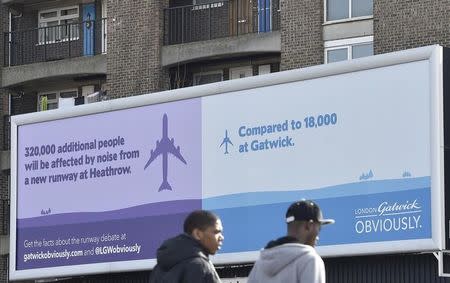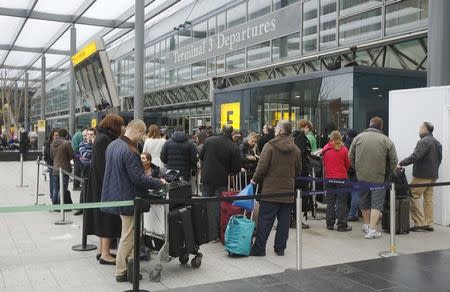Britain braces for political showdown over long-awaited airport decision
By Sarah Young LONDON (Reuters) - A decades-long battle to expand Britain's overcrowded airports is set for a crunch decision in the coming weeks, as the world's fifth-largest economy seeks to resolve a row that has bedevilled successive governments and risks choking economic growth. The UK's aviation sector is worth 32 billion pounds and represents 2.1 percent of its economy. But the country's top two airports Heathrow and Gatwick are at and near to maximum capacity and losing passengers to booming hubs like Dubai and Amsterdam's Schiphol that can offer more flights to new destinations like China. Business leaders and politicians can only agree on the need for a new UK runway: where it should be has been hotly contested for over 25 years. Now a government-appointed Airports Commission will emerge from three years of consideration to say in the next few weeks whether the necessary capacity should be built at Heathrow or Gatwick. It's a politically toxic issue that poses personal risks to Prime Minister David Cameron, who oversees a cabinet that is split on the issue and in 2009 before taking office told an audience of potential voters living under the Heathrow flight path that a third runway there would not happen - "no ifs, no buts" about it. "We are now set for a major political battle," said one person involved with one of the campaigns. To many, Heathrow, to the west of London, is the more obvious choice. The country's biggest airport is a hub where over a third of passengers are connecting onto other flights. Operating close to capacity, it has established connections to emerging markets, handles a quarter of all Britain's exports and boasts superior public transport infrastructure. But a new runway there would cost 19 billion pounds, estimates the Commission. And it would mean an increasing number of jets flying over some of most affluent and densely populated parts of the city, where the prospect of expansion has united a powerful coalition of opponents that include leading politicians in Cameron's party. In contrast, the cost of adding a new runway at the second-largest airport Gatwick, further to the south of the capital, is an estimated 9 billion pounds. Gatwick is not operating as close to capacity and so far has focussed on short-haul, leisure flights. It also has the advantage of a more rural position and a clean history of air quality unlike Heathrow which has in the past breached limits. Both are owned by firms that invest in infrastructure: Heathrow includes such shareholders as Spain's Ferrovial and investment funds from Singapore, China and Qatar while Gatwick is owned by Global Infrastructure Partners. ECONOMICS VS POLITICS While Heathrow has two runways and Gatwick just the one, Charles de Gaulle in Paris has four and Amsterdam's Schiphol Airport six. It will be at least ten years before Britain can start to catch up with them given rules about building planning and consultation. Many observers, including fierce opponents to a third runway at Heathrow, expect the commission and its chair Howard Davies to choose Heathrow. Heathrow estimates that a new runway would boost the British economy by 100 billion pounds. "We've come a long, long way politically and the mood has definitely changed and it's changed partly because the economic case is so much stronger now," said Heathrow Airport's Chief Executive John Holland-Kaye. But a strong economic case may not in the end be enough given the number of key Conservative constituencies that lie underneath Heathrow's flight path, said John Stewart, a leading campaigner against Heathrow expansion. "There are many big beasts in the cabinet who are utterly opposed to Heathrow and the government may ask itself is Heathrow politically deliverable even if Davies recommends it," he told Reuters. One major opponent is potential prime minister in waiting and London Mayor, Boris Johnson, who has said he would lie down in front of bulldozers to stop a third runway going ahead. It's this kind of publicity that leads anti-Gatwick campaigners like Crispian Blunt to fear their cause will not be heard. "Our concern is that the recommendation is politicised," said Blunt, also a Conservative politician. "The whole purpose of this commission was... to make a decision on the merits." Tom Papworth, director of economic policy at think tank CentreForum, concurred. "If Davies opts for Gatwick, the Conservatives pop the champagne corks and come out and announce that Gatwick will expand tomorrow," he said. GREEN LEVER Both sides hope to draw on environmental concerns to underpin their arguments: air quality in particular could be a sticking point. Two of Heathrow's 11 air monitors breached limits in 2014; the airport blamed a nearby motorway. Gatwick has not breached air quality limits. Another factor in the decision could be competition, and what happens to the airport that misses out. Papworth said this could enable anti-Heathrow Conservatives to make the case for Gatwick if the Commission chooses Heathrow. "They can easily claim that if Heathrow gets a third runway before Gatwick gets its second, Gatwick won't be able to compete, so they can make out that it is a competition issue," said CentreForum's Papworth. That's a factor that 66-year-old campaigner Stewart is clinging to. "It is already like a sky of sound and that sky of sound can only get louder and worse if there is a third runway," said Stewart, who has lived in south London for 30 years. "You just feel that these planes are always there." (Editing by Kate Holton and Sophie Walker)

 Yahoo News
Yahoo News 


